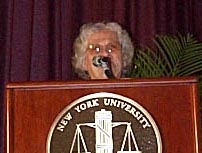|
WHERE IT
BEGAN
continued from page 2
|

Hall speaks on the sociological features of slaves in the
Americas.
|
Hall was more
concerned with the societal makeup of African slaves out of their
habitat - namely, in the Americas. One of her arguments concerned
the popular "fragmentation theory", the notion that large groups
of Africans of the same ethnicity, upon arriving as slaves, were
separated and grouped with Africans of different ethnicities to
create intentional confusion. Language barriers and other cultural
dissimilarities would keep down the possibility of rebellion, according
to the theory. Yet despite its popularity, Hall does not support
this notion.
"Just as
in voluntary immigration, people from one ethnicity tended to draw
members of that same ethnicity, she said. At this, audience members
grumbled in disapproval.
Hall has
been working on a database concerning the ethnicities of African
slaves in Louisiana for the past 15 years. Based on the results
of her research, she finds the ethnicities are too spread out and
the slave trade itself too disorganized as a whole for any large-scale
fragmentation process to have taken place.
Next, however,
Hall introduced new data concerning the racial history of slave
women in North America - a topic which drew a more favorable
reaction from the crowd. Since men are generally stronger than women,
-- and thus more suited
to hard labor -- males exported
to the Americas outnumbered females by a 2-to-1
ratio.
And if many of these women came from the same African region, as
her anti-fragmentation theory argument would posit, then African-American
roots can be traced more easily through women than through men.
In fact, she
said, a recent study shows that 60 percent of African-Americans
living in Los Angeles are of Senegambian descent. In arguing against
the fragmentation theory, Hall in fact was arguing for the same
thing that every African-American in the auditorium seemed to want
- a history.
|

![]()
